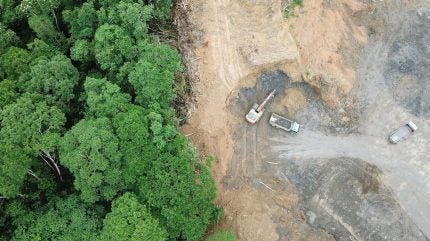
A report from the investor-backed FAIRR Initiative has criticised meat, fish and dairy producers over efforts to tackle methane emissions and deforestation.
The Coller FAIRR Protein Producer Index report issued today (1 December) concludes that “despite pockets of leadership and innovation, the animal agriculture sector is unprepared for the decade of transition on climate change and risks looking outdated and unattractive”.

Discover B2B Marketing That Performs
Combine business intelligence and editorial excellence to reach engaged professionals across 36 leading media platforms.
Following on the heels of the COP26 summit in Scotland, FAIRR says only 18% of global meat and dairy producers even track partial methane emissions. And meat giants with a zero-deforestation pledge, such as Brazilian heavyweights JBS and Marfrig Global Foods, “do not have full visibility of the third-party suppliers that are responsible for up to 90% of deforestation from sourcing cattle”.
Jeremy Coller, chair and founder of the US$45trn FAIRR investor network, said: “As the largest driver of both methane from human activity and deforestation, the ambitions set at COP26 handed a big slice of responsibility to the food and agriculture sector… yet failures from methane to manure management underline the growing sense in the market that cows are the new coal.”
The Changing Markets Foundation was also highly critical of meat and dairy firms in a report published in October, concluding that a more “transformative” approach is needed to tackle so-called CH4 emissions.
A pledge was also made at COP26 by ten commodity related companies, including JBS and Cargill in the US, to end deforestation by 2030. And JBS followed up with a plan to use a feed supplement developed by Dutch ingredients business DSM to try to cut the methane produced by cows.

US Tariffs are shifting - will you react or anticipate?
Don’t let policy changes catch you off guard. Stay proactive with real-time data and expert analysis.
By GlobalDataFAIRR’s index, now in its fourth year, assesses 60 publicly-listed animal protein producers with a combined $363bn market value against ten environmental, social and governance-related factors, including greenhouse gas emissions, deforestation, antibiotic usage and investment in alternative proteins.
Not all of the firms monitored fared badly. Three Norwegian aquaculture firms – Mowi, Grieg Seafood and Lerøy Seafood Group – are represented in the top five indexed companies, with the highest-ranking meat and dairy firms being Maple Leaf Foods (Canada), Marfrig (Brazil) and Fonterra (New Zealand).
But when it comes to deforestation, the report revealed 42 of 45 (93%) meat and dairy firms that source soy (for animal feed) from high-risk deforestation areas such as the Cerrado region in Brazil, do not have a policy to mitigate deforestation in all sourcing.
It said monitoring of indirect suppliers (those who supply a firm’s direct suppliers) of cattle remains a problem and misses up to 90% of deforestation.
Even companies with a zero-deforestation pledge do not have full visibility of these indirect suppliers, the report said.
Coller added: “We cannot deliver the COP26 commitments without addressing the protein supply chain. More political and regulatory focus on the food industry is now inevitable, but currently only 20% of meat and dairy giants measure even some part of their methane emissions.
“This should be a red flag to markets given the COP26 commitment to reduce methane 30% globally by 2030.
“We are at an inflection point and if we are to avoid the meat and dairy sector becoming a stranded asset, we must harness the leadership emerging in parts of the industry and transform the way our food, particularly protein, is produced.”
Just Food asked JBS and Marfrig for their reaction to the report outside of Brazilian office hours.
In a statement, JBS said: “The improvement of JBS’ results year on year reflects the priority placed on ESG. Sustainability is our guiding business strategy. We are committed to achieve Net Zero by 2040 and we are focused on actions to reduce emissions throughout our value chain. That’s why we have been monitoring suppliers for over ten years [and] extending due diligence to the suppliers of our suppliers using blockchain technology, among other initiatives.”
Marfrig said: “The most recent Coller FAIRR Protein Producer Index confirms the work and results achieved by the sustainability policies and practices adopted by Marfrig. In the beef sector, Marfrig is the best positioned company and the only one classified as low risk. In one year, Marfrig’s overall score increased by 7.7%, reflecting the actions and results already achieved by the Marfrig Verde+ Plan, launched in July 2020.”
Read Just food’s analysis: Eyes turn to COP27 after food conspicuous by its absence at COP26





